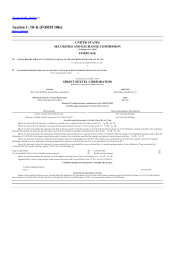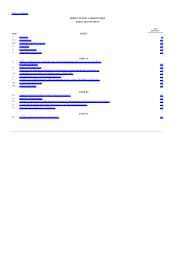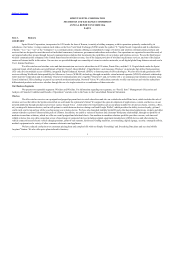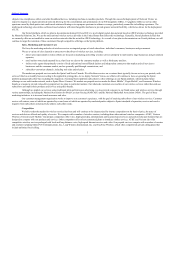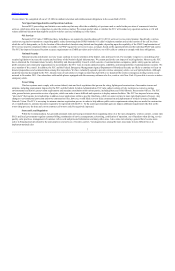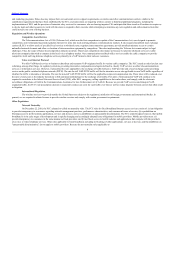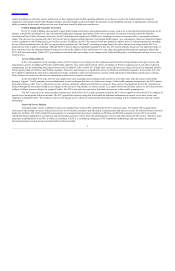Sprint - Nextel 2011 Annual Report Download - page 8
Download and view the complete annual report
Please find page 8 of the 2011 Sprint - Nextel annual report below. You can navigate through the pages in the report by either clicking on the pages listed below, or by using the keyword search tool below to find specific information within the annual report.
Table of Contents
licenses held by other persons and organizations;
We hold 1.9 GHz, 800 MHz, and 900 MHz FCC licenses authorizing the use of radio frequency spectrum to deploy our wireless services. We also hold FCC
licenses that are not yet placed in service but that we intend to use in accordance with FCC requirements.
1.9 GHz PCS License Conditions
All PCS licenses are granted for ten-year terms. For purposes of issuing PCS licenses, the FCC utilizes major trading areas (MTAs) and basic trading areas
(BTAs) with several BTAs making up each MTA. Each license is subject to build-out requirements which we have met in all of our MTA and BTA markets.
If applicable build-out conditions are met, these licenses may be renewed for additional ten-year terms. Renewal applications are not subject to auctions. If a
renewal application is challenged, the FCC grants a preference commonly referred to as a license renewal expectancy to the applicant if the applicant can demonstrate that
it has provided “substantial service” during the past license term and has substantially complied with applicable FCC rules and policies and the Communications Act. The
licenses for the 10 MHz of spectrum in the 1.9 GHz band that we received as part of the FCC's Report and Order, described below, have ten-year terms and are not subject
to specific build-out conditions, but are subject to renewal requirements that are similar to those for our PCS licenses.
800 MHz and 900 MHz License Conditions
Spectrum in our 800 MHz and 900 MHz bands originally was licensed in small groups of channels, therefore we hold thousands of these licenses, which
together allow us to provide coverage across much of the continental United States. Our 800 MHz and 900 MHz licenses are subject to requirements that we meet
population coverage benchmarks tied to the initial license grant dates. To date, we have met all of the construction requirements applicable to these licenses, except in the
case of licenses that are not material to our business. Our 800 MHz and 900 MHz licenses have ten-year terms, at the end of which each license is subject to renewal
requirements that are similar to those for our 1.9 GHz licenses.
Spectrum Reconfiguration Obligations
In 2004, the FCC adopted a Report and Order that included new rules regarding interference in the 800 MHz band and a comprehensive plan to reconfigure the
800 MHz band (the “Report and Order”). The Report and Order provides for the exchange of a portion of our 800 MHz FCC spectrum licenses, and requires us to fund
the cost incurred by public safety systems and other incumbent licensees to reconfigure the 800 MHz spectrum band. Also, in exchange, we received licenses for 10 MHz
of nationwide spectrum in the 1.9 GHz band; however, we were required to relocate and reimburse the incumbent licensees in this band for their costs of relocation to
another band designated by the FCC.
Our minimum cash obligation is approximately $2.8 billion under the Report and Order. We are, however, obligated to pay the full amount of the costs relating
to the reconfiguration plan, even if those costs exceed $2.8 billion. As required under the terms of the Report and Order, a letter of credit has been secured to provide
assurance that funds will be available to pay the relocation costs of the incumbent users of the 800 MHz spectrum. We submit the qualified 800 MHz relocation costs to
the FCC for review for potential letter of credit reductions on a periodic basis. As a result of these reviews, our letter of credit was reduced from $2.5 billion at the start of
the project to $1 billion as of December 31, 2011, as approved by the FCC.
Completion of the 800 MHz band reconfiguration was initially required by June 26, 2008. The FCC continues to grant 800 MHz public safety licensees
additional time to complete their band reconfigurations which, in turn, delays our access to some of our 800 MHz replacement channels. Accordingly, we will continue to
transition to our 800 MHz replacement channels consistent with public safety licensees' reconfiguration progress; however, we anticipate that continuing reconfiguration
progress will be sufficient to support the 800 MHz portion of our Network
6
• govern the interconnection of our networks with other wireless and wireline carriers;
• establish access and universal service funding provisions;
• impose rules related to unauthorized use of and access to customer information;
• impose fines and forfeitures for violations of FCC rules;
• regulate the technical standards governing wireless services; and
• impose other obligations that it determines to be in the public interest

